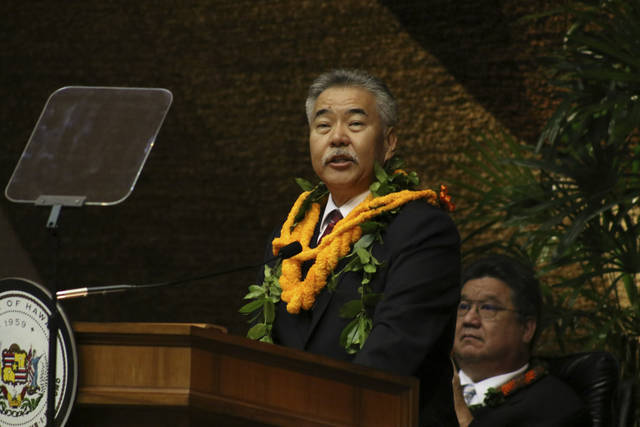HONOLULU — Gov. David Ige on Tuesday laid out what he called a roadmap for creating universal public preschool in Hawaii over several decades.
The governor introduced his idea during his State of the State address at the Capitol, the first such speech of his second term.
The central part of the plan is to offer pre-kindergarten through fifth grade at elementary schools instead of the current kindergarten through grade six. Grade six would become part of middle schools.
The governor noted research shows early childhood education is critical for brain development. Children’s early years set the stage for how well they learn for the rest of their lives, he said.
“Yet in Hawaii, we have left that important task to others and only for families who can afford private preschool tuition,” Ige said. “It doesn’t have to be that way.”
Hawaii needs more than 300 public pre-kindergarten classrooms, he said. This is a long-term goal, but the state doesn’t have to wait to start until it has funding for all of it, he said.
Phasing-in public preschool will give the state the time to ensure that it has qualified preschool teachers to staff the classes, Ige said.
House Speaker Scott Saiki said after the speech that the House shares governor’s goal of establishing universal preschool.
But Majority Leader Della Au Belatti said it would cost the state $500 million to use existing space at schools for pre-kindergarten classes and expand other schools to accommodate the additional classes.
“This is going to be a long-term, huge impact to the budget,” Belatti said, noting money would be needed to pay for salaries and operations.
Senate Vice President Michelle Kidani, who is also chairwoman of the Senate education committee, said she thinks it’s a great idea. But she said there are only so many dollars to go around.
“All of us totally believe in early learning. It’s just a matter of how we cut up the pie to do this,” Kidani said.
Ige told reporters after his speech that his plan would focus on schools that already have space for the new classrooms.
The governor said he doesn’t have a figure for how much the entire plan would cost because it would depend on the situation at each school.
He said focusing on restructuring elementary schools would reduce the cost somewhat because most additional classrooms would be at middle schools rather than spread through every elementary school.
“Now obviously it’s a decades-long process. But if we don’t have a goal and we don’t have a vision, then we’ll never get there,” Ige said.
The governor also said in his speech that he would submit legislation to build condominiums on state land and allow people to purchase 99-year leases for the units. His proposal is similar to one from state Sen. Stanley Chang.
He also wants to remove the existing cap on the amount of hotel tax revenue the four counties receive from the state. Currently the counties split $103 million generated by the transient accommodations tax. But Ige says the counties should get a straight percentage of the revenue generated.
Senate Majority Leader Sen. Kalani English said senators in general support the idea, but a final decision would depend on the details.
Saiki expressed concern over how much revenue the state would lose from this proposal. He said the bottom line is “how do the numbers work out?”


